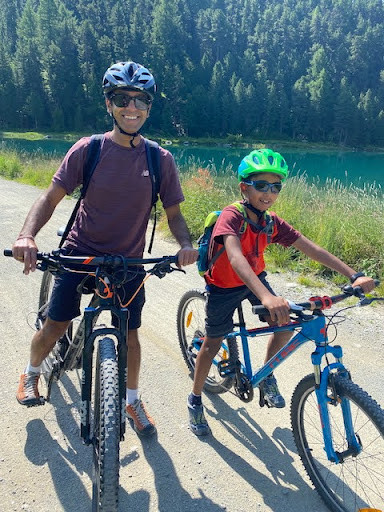From Personal Battle to Global Mission: How Sawera Health Foundation Is Bridging the Cancer Care Gap in Children

When Abhishek and Divya Avasthi's young son was diagnosed with a rare form of leukemia in December 2018, their lives were upended overnight. What followed was not just the battle to save their child's life, but the realization of how unprepared even the world's best healthcare systems were to support families through the daily realities of childhood cancer.
"The shock, the chaos, the fear, it was overwhelming," Avasthi recalls. "We were grateful to be in one of the strongest healthcare systems in the world, but once we left the hospital, we were on our own. Managing his treatment, his schooling, our jobs, and just keeping family life together felt impossible."
The Avasthis cobbled together a system to cope: a color-coded spreadsheet that tracked medications, blood values, hospital visits, therapy adjustments, and daily needs. It helped bring order to chaos, and it worked. Their son survived. But as they spoke to other families, they realized they were not alone in facing this overwhelming gap.
Out of that realization came Sawera Health Foundation, a not-for-profit named after the Hindi word for "a new day." What began as a deeply personal solution now aims to address one of the most pressing global health challenges: how to ensure children with cancer not only receive treatment but complete it successfully.
Every year, an estimated 400,000 children worldwide are diagnosed with cancer. In high-income countries, survival rates have climbed steadily thanks to advances in medicine, but in lower- and middle-income countries, outcomes remain devastatingly low. Treatment abandonment, when families stop treatment midway due to cost, distance, literacy barriers, or lack of support, is a major driver of this gap.
"In Switzerland, even with resources, we felt lost," says Avasthi. "That's when I thought, if it was this hard for us, imagine how difficult it must be for families in the developing countries, where hospitals are overcrowded, distances are long, and information is not accessible. Children are losing their lives not just because of cancer, but because they cannot stay on track with treatment."
This realization fueled Sawera's mission: to build digital health tools that empower families, clinicians, and researchers to bridge this gap.
At the heart of Sawera's work is the Sawera App, a digital companion designed for families navigating leukemia treatments. It enables parents to track complete therapy plans through personalized calendars, manage medications with accuracy, even as dosages change. Record blood values to support day-to-day decisions. Additionally, the app has a feature where it shares treatment profiles across family members for coordinated care.
The app not only reduces the administrative burden on overwhelmed parents but also enhances communication with doctors and provides researchers with insights into how treatments play out at home. Childhood cancer is not just a child's illness, it's a family illness, or as Avasthi puts it, "When a child is sick, the whole family is sick.". "The app is about helping families hold it together, ensuring no child is left behind in their treatment journey."
Recognizing that no single organization can solve a problem of this scale, Sawera has built its model on collaboration.
In India, Sawera has partnered with Aroh Foundation, a grassroots group working in public hospitals to bridge care gaps for families with limited means. Together, they aim to tackle treatment abandonment directly, combining digital health with on-the-ground support.
They are also members of a global umbrella organization that brings together nonprofits, hospitals, and researchers to improve capacity and resources. These partnerships ensure Sawera's tools are integrated at the right point in the patient pathway, whether through hospitals, social workers, or community organizations.
"The mission is bigger than us," says Avasthi. "It's about building a system of care where technology supports people, where researchers get real-world data, and where families are never left to navigate cancer alone."
While the Sawera App currently focuses on leukemia, the most common childhood cancer, making up about a third of diagnoses, the foundation is building it to scale across other pediatric cancers.
Their future vision spans three goals. One of them is empowering families to manage treatments, report issues early, and reduce abandonment. Furthermore, Avasthi envisions supporting researchers with real-life insights into side effects, adherence, and long-term care. By reducing burdens on healthcare systems by improving compliance and shifting care from hospitals to homes, Avasthi sees it as a comprehensive action without compromising outcomes.
In the coming years, Sawera plans to expand its reach into regions where survival rates remain lowest. But such ambitions require funding and ongoing partnerships. "We started with our own story, but this is a global crisis," Avasthi says. "Every child deserves a chance at survival, no matter where they are born. That's why we're asking for support, from funders, partners, and communities, so that Sawera can continue to bring a new day for families everywhere."
© Copyright IBTimes 2025. All rights reserved.





















